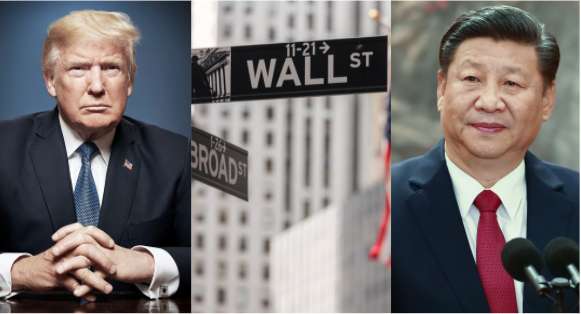While American President Donald Trump goes all out in his showdown with the People Republic of China and its President Xi Jinping by taking the paper dragon head-on wherever he can, there is one front, albeit in his own backyard that is threatening to undo all the work laid by him to corner China.
Wall Street, ever since the Great Recession of 2008, has found China as a safe haven for its investments. While it was understandable in the aftermath of a once-in-a-lifetime catastrophic event like 2008 that Wall Street wanted to make sure it didn’t lose any money in the future, but of late, China has become the only prominent spot for the investors and it can surely backfire any instant now.
Wall Street giants such as Goldman Sachs Group Inc. and JP Morgan Chase & Co. have tens of billions of dollars at stake in China as political tension risks derailing the nation’s opening of its $45 trillion financial markets. Five big US banks had a combined $70.8 billion of exposure to China in 2019, with JP Morgan alone ploughing $19.2 billion into lending, trading and investing. That’s a 10% increase from 2018.
If these numbers alone do not paint the real picture of Wall Street’s bet on China then consider these developments.
Goldman Sachs and Morgan Stanley recently took majority control of their Chinese securities ventures. HSBC acquired full control of its Chinese life-insurance venture. Citi received a coveted custody license to serve institutional investors in China. Among asset managers, Black Rock received approval to sell its own mutual funds in China and Vanguard decided to shift its Asian headquarters to Shanghai.
According to Goldman estimates, profits in China’s brokerage industry could hit US$47 billion by 2026. There are US$8 billion in estimated commercial banking profits as well as a projected US$30 trillion in overall assets to go after, also being pursued by fund giants mentioned above like Blackrock and Vanguard Group.
Such is the thirst of Wall Street to make inroads in China that companies like Goldman Sachs are hiring sons, daughters, nephews and nieces of CCP’s Politburo in its plush US offices without any experience and qualification to show its goodwill. In 2016 JP Morgan Chase was fined by American regulators for giving jobs to well-connected Chinese “princelings”.
A Netflix documentary by the name China Hustle also depicts the Blue-collar workers of Wall Street taking dubious methods to punt their fortunes on China.
After years of trade war turmoil, US policymakers are now starting to aim at the financial industry amid growing scepticism over American firms ploughing money into a country perceived as a big geopolitical foe.
Policymakers and lawmakers are looking at restricting US pension fund investments in Chinese companies and limiting the ability of Chinese companies to raise capital in the US.
With such big bucks on the table, it is natural that these companies will lobby hard to stop Trump from undertaking these moves.
While Wall Street goes all out to serenade China, the Trump administration, so far, has been unperturbed in culling the Chinese threat in the US Stock exchanges.
As reported by TFI, The US Senate had passed a bill, which if signed into law can lead to as many as 800 Chinese companies getting delisted.
The reason Trump went ahead with this move was that Beijing does not allow the American authorities to examine the audit-books of the listed Chinese companies. The conspicuous Dragon claims that the audit-books are national secrets and cannot be shared with other parties.
The moment the bill becomes a law, the United States will be able to block capital market access to Chinese companies, averting the ‘Chinese Hustle’ whereby Chinese companies have been cheating the American investors all this while through securities fraud.
From a purely fiscal point of view, what Wall Street did by gambling truckloads in China is not unethical but the heightened tensions between the two nations and Trump’s solemn vow to take down China can ultimately lead to friction between the two factions.
Wall Street managed to dodge the carnage of the U.S.-China trade war, but it could be among the biggest losers from the ongoing developments. From the little we have seen of Trump in the last four years, it wouldn’t be hyperbole to predict that he might cut the umbilical cord connecting China and Wall Street for good, even if it meant losing out on the favour of them.
